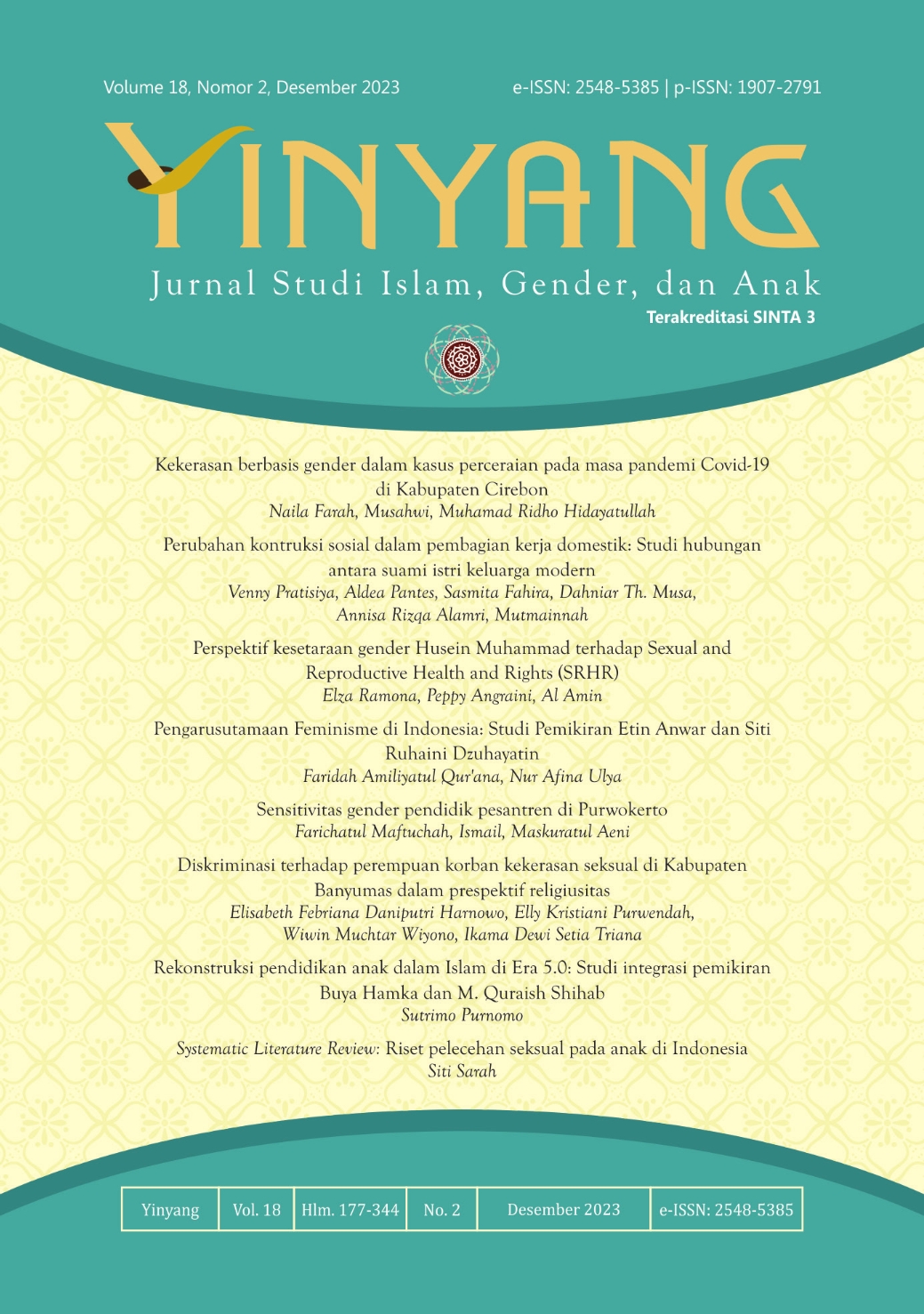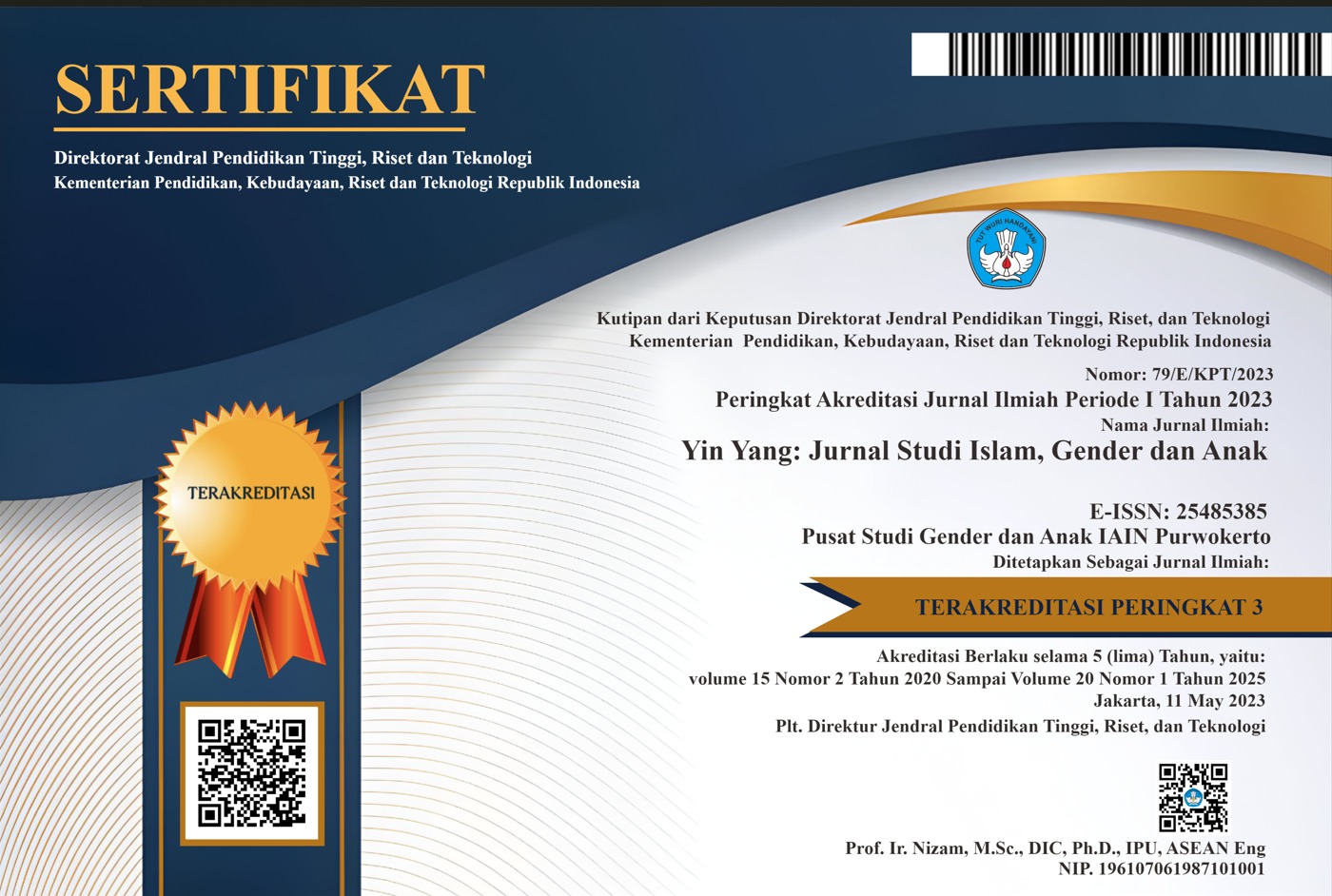Perubahan kontruksi sosial dalam pembagian kerja domestik: Studi hubungan antara suami istri keluarga modern
DOI:
https://doi.org/10.24090/yinyang.v18i2.8573Keywords:
Domestic roles, Modern Family, Social ConstructionAbstract
The aim of this research is to analyze changes in social construction and the division of domestic labor in modern households in an urban environment. Social construction, which involves norms, values and social expectations, plays an important role in the division of domestic labor in the family. Factors such as cultural traditions, religion, internalized gender roles and influences from the social environment contribute to the formation of social construction. The research method used is qualitative literature study, researchers analyze and collect scientific articles, journals, books and other sources relevant to this research topic. The theory used is social construction theory developed by Peter L. Berger and Thomas Luckmann. This theory is used to identify how norms, values and social roles in domestic work are constructed, internalized and changed in the context of the modern family. The results of this research show that stereotypical gender roles and behavioral expectations for women in domestic work burden women in the unequal division of work between husband and wife. Apart from that, this research also shows that there are various significant changes in the social construction related to domestic work in modern families, such as shifts in gender roles and awareness of gender equality. One of the factors that can influence a husband and wife or a modern family to adopt an egalitarian division of labor is education, work experience and individual values.References
Admin. (2011). Peran-Peran Gender. Koalisi Perempuan Indonesia. https://www.koalisiperempuan.or.id/2011/05/04/peran-peran-gender/
Agustang, A. T. P., Said, M., & Rasyid, R. (2015). Seminar Nasional: Revolusi Mental Dan Kemandirian Bangsa Melalui Pendidikan Ilmu- Ilmu Sosial Dalam Menghadapi MEA 2015, 116–123. https://ojs.unm.ac.id/PSN-HSIS/article/download/2190/1116
Gracia Danarti. (n.d.). 3 Pakar Bicara Tantangan Keluarga Modern. Femina. https://www.femina.co.id/family/3-pakar-bicara-tantangan-keluarga-modern
Halizah, L. R., & Faralita, E. (2023). Budaya patriarki dan kesetaraan gender. Wasaka Hukum, 11(1), 11–32.
Hidayati, N. (2015). ( Antara Domestik dan Publik ). Muwazah: Jurnal Kajian Gender, 7(2), 108–119.
Kusuma, N. (2021). Pembagian Kerja Antara Suami dan Istri Dalam Rumah Tangga Nelayan (Studi di Kampung Nelayan Pondok Perasi Kelurahan Bintaro). Resiprokal: Jurnal Riset Sosiologi Progresif Aktual, 3(1), 45–57. https://doi.org/10.29303/resiprokal.v3i1.61
Leslie Retno Angeningsih, Agustinus Bima Nugraha. (2022). Gender dan Pembagian Kerja Rumah Tangga Permeabel Kebahagiaan Suami-Isteri (Kajian Dampak Covid-19 Pada Keluarga Hunian Tetap “Dongkelsari” Gungan Wukirsari Sleman). Jurnal Masyarakat Dan Desa, 2(1), 1–38. https://doi.org/10.47431/jmd.v2i1.206
Marsyanda Putri. (2022). Mengenal Apa Itu Double Burden dan Solusi Mengatasinya. Swara Kamu. https://swara.tunaiku.com/mengenal-apa-itu-double-burden-dan-solusi-mengatasinya/
Maula, B.S.; Ariyanti, V. (2022). "Justice Negotiations for Women: Divorce Cases Due to Domestic Violence in Religious Courts", Jurnal Hukum Islam 20 (1), 155-180.
Muhammad Irfan Syuhudi. (2020). Agama dan Kebudayaan. Umbara, 1(1). https://doi.org/10.24198/umbara.v1i1.9604
Nikmatul, C. P. (2021). Keadilan dan Kesetaraan Gender dalam Peran Orang Tua Dalam Mengasuh Anak : Prepektif Pasangan Menikah Muda. Equalita: Jurnal Studi Gender Dan Anak, 3(2), Yoseph Hary W. (2019, July). Dampak EQ Lemah, Rend. http://syekhnurjati.ac.id/jurnal/index.php/equalita/article/view/8749%0ADiterbitkan
Nuroniyah W.; Maula, B.S. (2022). "Muslim Women Adhering to Minagkabau’s Bajapuik Tradition in Cirebon, West Java: Compromizing a Gendered Culture in Islamic Law", Ijtihad: Jurnal Wawasan Hukum Islam dan Kemanusiaan 22 (2), 135-154.
Puspananda, D. R. (2022). Studi Literatur: Komik Sebagai Media Pembelajaran Yang Efektif. Jurnal Pendidikan Edutama, 9(1), 51–60.
Putri, D. P. K., & Lestari, S. (2015). Pembagian peran dalam rumah tangga pada pasangan suami istri Jawa. Jurnal Penelitian Humaniora, 16(1), 72–85. http://journals.ums.ac.id/index.php/humaniora/article/view/1523
Putung, S. H., & Ag Basir, D. H. (2017). Penglibatan Suami Dalam Kerja-Kerja Rumah Tangga: Kajian Kes Di Sabah. Jurnal Fiqh, 14(1), 1–26. https://doi.org/10.22452/fiqh.vol14no1.1
Ramadhania, D., & Utami, D. (2021). Pola Pembagian Kerja pada Keluarga Buruh Bangunan (Studi pada Buruh Bangunan di Kawasan Citraland Surabaya. Paradigma, 10(1).
Rosyidah, F. N., & Nurwati, N. (2019). Gender dan Stereotipe: Konstruksi Realitas dalam Media Sosial Instagram. Share : Social Work Journal, 9(1), 10. https://doi.org/10.24198/share.v9i1.19691
Sakina, A. I., & A., D. H. S. (2017). Menyoroti Budaya Patriarki Di Indonesia. Share : Social Work Journal, 7(1), 71. https://doi.org/10.24198/share.v7i1.13820
Setiawan, E. (2017). Konstruksi Sosial Pembagian Kerja Dan Pengupahan Buruh Tani. YINYANG: Jurnal Studi Islam, Gender Dan Anak, 12(1), 19–34. https://doi.org/10.24090/yinyang.v12i1.2017.pp19-34
Sipa, A. M. D. (2021). Stereotipe Perempuan: Antara Ruang Publik dan Domestik. Geotimes. https://geotimes.id/opini/stereotipe-perempuan-antara-ruang-publik-dan-domestik/
Studi, P., Sosiologi, P., & Mangkurat, U. L. (2023). Analisis Gender (Studi Pembagian Peran Domestik Pada Keluarga Petani Di Desa Banua Hanyar Kecamatan Pandawan Kabupaten Hulu Sungai Tengah). 323–338.
Yohanes Enggar Harususil. (2023). Menilik Budaya Patriarki di Indonesia. Kompas.Com. https://www.kompas.com/tren/read/2023/04/12/180000665/menilik-budaya-patriarki-di-indonesia?page=all#page2
Zed, M. (2014). Metode Penelitian Kepustakaan.
Zuhri, S., & Amalia, D. (2022). Ketidakadilan Gender dan Budaya Patriarki di Kehidupan Masyarakat Indonesia. Murabbi : Jurnal Ilmiah Dalam Bidang Pendidikan, 5(1), 17–41. https://ejournal.stitalhikmah-tt.ac.id/index.php/murabbi/article/download/100/99
Downloads
Published
How to Cite
Issue
Section
License
Copyright (c) 2023 Venny Pratisiya, Aldea Pantes, Sasmita Fahira, Dahniar Th Musa, Annisa Rizqa Alamri, Mutmainnah Mutmainnah

This work is licensed under a Creative Commons Attribution-ShareAlike 4.0 International License.
Authors who publish with this journal agree to the following terms: Authors retain copyright and grant the journal right of first publication with the work simultaneously licensed under a Creative Commons Attribution-ShareAlike 4.0 International License that allows others to share the work with an acknowledgment of the work's authorship and initial publication in this journal.














